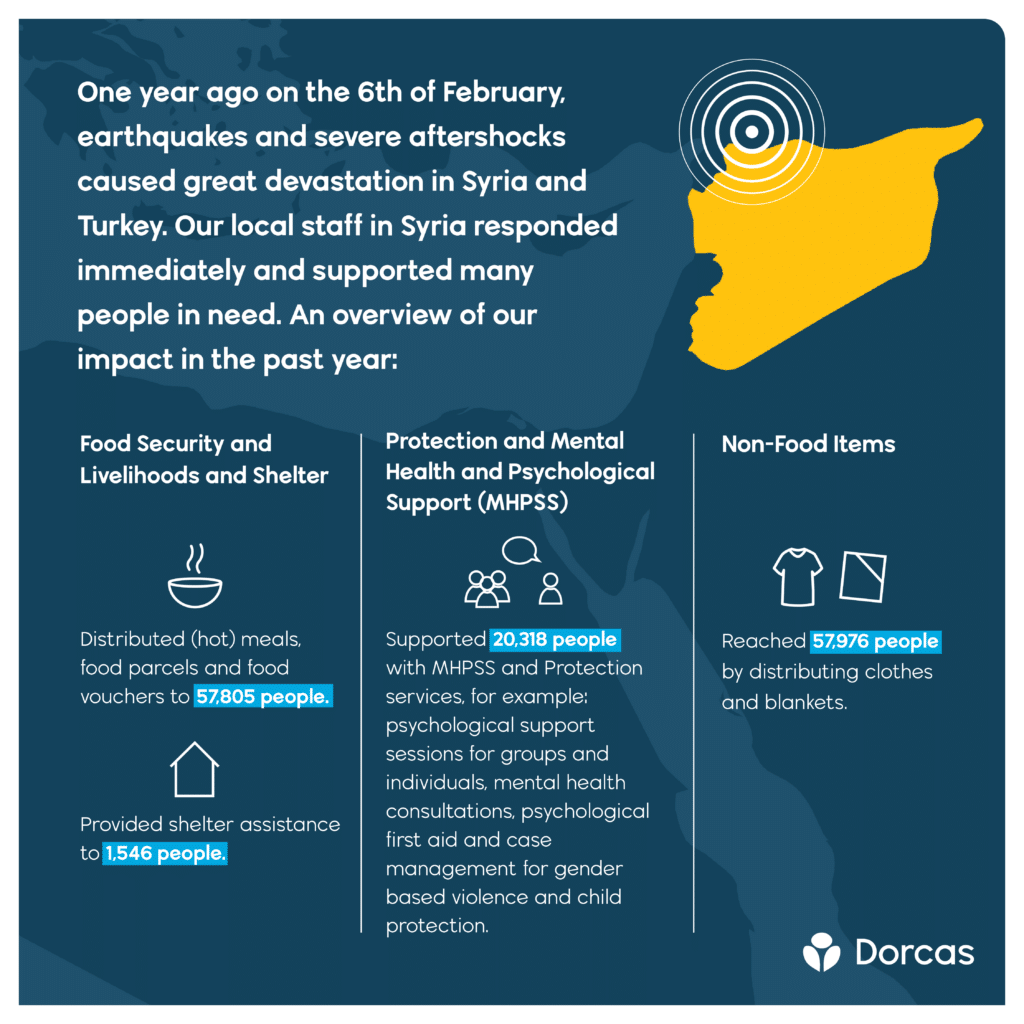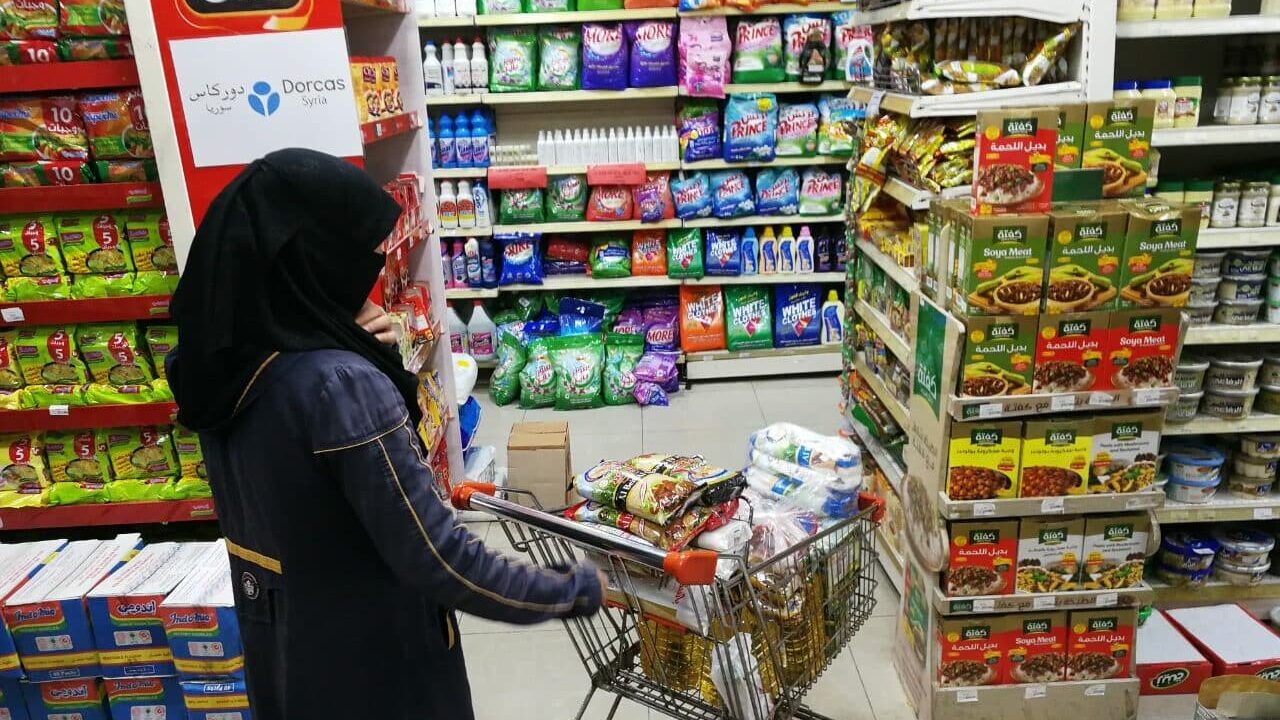One year after the earthquake in Syria: How did Dorcas support those in need
One year ago, on the 6th of February, earthquakes and strong aftershocks caused great devastation in Syria and Turkey. Syria, already in crisis due to the ongoing conflict, was again hit by a disaster that affected thousands of its citizens. The earthquake caused widespread damage to infrastructure and civilian buildings in the governorates of Aleppo, Hama, Idleb and Lattakia.
Dorcas had been working in Syria for many years when the earthquake struck. This meant that our local staff were able to respond immediately, resulting in a strong presence on the ground. In the past year, Dorcas provided ongoing food security and livelihood support, shelter assistance, MHPSS and protection services, as well as essential non-food items. The infographic below shows a summary of the support that Dorcas provided in the region:

Food Security and Livelihoods and Shelter
Dorcas has had a local presence in north-west Syria for years, around the cities of Aleppo and Homs. These regions have struggled with food insecurity long before the earthquake struck. The new disaster exacerbated this problem. In the aftermath of the earthquake, the availability of basic commodities was limited. With cold temperatures, especially at night, it was imperative that people had access to a safe and warm environment and a decent meal, and this was therefore a top priority in the disaster response. Dorcas Syria supported 57,805 people with (hot) meals, food parcels, lunches or food vouchers over the past year. In addition, we provided shelter assistance to 1,546 people.
One of the people Dorcas Syria has supported through the food security services is Zainab. Zainab lives with her two sisters and her brother and his wife and children in the Al Hellok area. After the earthquake, the atmosphere in their home became one of constant tension and a sense of impending danger. The situation was made worse when her brother, Mohammad, lost his job, leaving the family to rely solely on Zainab’s meagre income. Zainab and her family registered at the Dorcas Community Centre in Hellok after she heard about it through acquaintances. Because of their difficult circumstances, Zainab’s family qualified for Dorcas’ food programme, and this provides monthly food vouchers. Zainab expressed her joy and relief when she visited the centre to collect the vouchers: ‘The burden has been lifted from my shoulders’. The family had been constantly hungry, struggling to meet basic needs for medicine, clothes and school supplies. ‘The voucher also helped us provide a variety of nutritious foods that were previously missing from our meals’. This improved the overall health of the family.

MHPSS and Protection services.
The earthquake and aftershocks had an enormous impact on people’s lives and general wellbeing. In such a crisis, the provision of MHPSS is vital because the enormous amount of stress that people experienced could lead to a range of other complaints. Providing this has been a major priority for the team over the past year. Dorcas already had a MHPSS support team on the ground, consisting mainly of social workers and psychologists, and was able to provide MHPSS and protection services to 20,318 people in the past year.
One of the people Dorcas supported through these services, is Rokaya. Rokaya (50) is a widow living in Aleppo with her four daughters. In the aftermath of the earthquake, Rokaya was facing numerous hardships like damage to their home, chronic illness and extreme poverty. One of her daughters received psychological first aid from Dorcas, and the family was registered to access the centre’s services. Her daughters were also deeply affected by the disaster, and Rokaya saw the support of the centre as an opportunity to alleviate her family’s psychological pain and fear. Dorcas provided Rokaya and her family with psychological support and access to the food aid programme. She became stronger and more resilient and regained her sense of dignity. On top of that, she also formed meaningful friendships during the support sessions. Rokaya envisions a brighter future for herself and her family, emphasising the invaluable impact of the programme on her life.
Non-Food Items
After the disaster, there was also a great need for non-food items, such as clothes and blankets. In the past year, Dorcas reached 57,976 people with this support.
What is needed in the coming year(s)?
The suffering in Syria must not be forgotten. After the earthquake, there was a resurgence of attention to the needs of the Syrian people, but that attention has slowly faded. At the moment, however, the situation in Syria is worse than it was before the earthquake. Compounding the situation is the enormous inflation that the country is experiencing. An UN OCHA 2024 Humanitarian Needs Overview for Syria estimates that some 16.7 million people across Syria will require humanitarian assistance in 20241. According to the Dutch Relief Alliance multi-sectoral needs assessment done during August and September 2023, there are many needs in different fields, that require the attention of the humanitarian sector2. These needs are for example:
- A large percentage of households struggle with poor food consumption (e.g. 64.6 per cent in Aleppo).
- Of those who participated in the assessment, 86.3 per cent rely on temporary or unstable daily work as the best source of income for their household.
- Mental health is still a major concern. Children and first responders in particular are experiencing burnout and distress. Several reports point to the need for MHPSS due to the extreme trauma and stress caused by the earthquake.
- In the areas identified in the assessment, there are significant protection risks and concerns for girls and women, e.g. forced and early marriages, harassment, sexual exploitation, domestic violence and child neglect.
- The deteriorating economy, living conditions, inflation and increased fuel prices, which led to increased prices of medicines, create a number of barriers for people to access health services.
Dorcas will continue to be on the ground in Syria, providing support to those in need. Najla Chahda, Country Director of Dorcas Syria, describes Dorcas’ priorities for this year:
‘The needs of the Syrian people remain urgent, and they require the ongoing support of the international humanitarian community. Dorcas will continue to create meaningful impact and invest in sustainable change in the lives of people who are most marginalised. Key priorities for this year lie withing expanding geographical coverage to support more people in need. We will also further enhance our key approaches, like Protection through community centre activities, Food Security and Livelihoods, shelter rehabilitation and health support’.
1Syrian Arab Republic: 2024 Humanitarian Needs Overview (December 2023)
2 Dutch Relief Alliance: Joint Multi-Sectoral Needs Assessment (2023).
06 February 2024
Are you inspired?
Read the next story or contact us to get to know more about making an impact together.